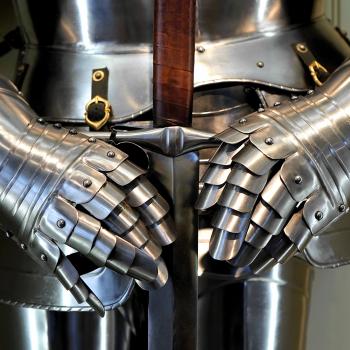To Train Up A Child, chapter 14, part 2
Today we’ll finish up the chapter on “emotion control.” As a reminder, we’re reviewing Michael Pearl’s child rearing manual, To Train Up A Child. My parents used this book with me as I grew up. As I became a parent myself I came to see Michael’s advice as toxic and even abusive. And indeed, his book has been linked to three children’s deaths. In this series we dismantle it piece by piece.
POOR THING, WHERE DOES IT HURT?
For your childrens’ own good, teach them to maintain control of their emotions. If you do not want to produce a sissy who uses adversity as a chance to get attention, then don’t program them that way. When your toddler falls over on the floor, don’t run and pick him up, speaking in an alarmed sympathetic voice.
I remember a stunt performed, when I was only about eight years old, for the entertainment of all the adults present. My little toddler cousin was sitting on the floor playing happily, when my older cousin said, “Watch this.” Speaking to the infant in a pitiful, compassionate voice, he said, “Oh! is the baby hurt? Poor thing. What did you do? Does it hurt? Show it to Mama.” Sure enough, my happy little cousin puckered up, started crying and made his way to his mother for emotional support. To the roar of the adults, she picked him up, told him it would be all right, brushed off the imaginary dirt, and sat him back on the floor to continue happily playing. I instantly programmed that away for future use. Over the years, I observed that same phenomenon many times. Only once or twice was it done deliberately for entertainment. The other times a mother was rushing to her child’s real or imagined distresses.
It is absolutely true that when a young kid hurts themselves, the parent’s response plays a role in how they react. I try to react in a way that helps my kids’ build confidence and resourcefulness but—and this is key—in a way that also shows them that I care about them, and that I am there for them when they are hurt. I want to build their confidence in themselves and in me. I want them to learn that they can handle a little pain and work through problems themselves but also that they can count on me to listen to them. And that seems to be the bit Michael is missing, as we go on.
TOUGH TEENS
When I was yet young I determined that I would rear no sissies. When an infant fell over from a sitting position to the floor and bumped his head, we pretended to ignore it. When a toddler took a spill, we let him lie, whimper a second and then climb back up for another try. When a toddler fell out of the wagon or stumbled into the dirt, we let him deal with it. When the young ones wrecked their bicycle and skinned their knee, we paid no attention except to say something like, “You shouldn’t go so fast until you learn to ride better.” They would come in to dinner and we would see bloody knees or skinned hands and ask, “What happened to you, tiger?” “Oh, nothing. Just slid out on the curve in the loose gravel. I think I can make it next time.” “Take it easy. Don’t break something.”
I really really really dislike the word “sissy.” It is typically used to bully children who are perceived as not tough enough, and it does so by connecting the feminine with weakness. I am, however, not at all surprised that Michael is willing to use the word. It’s very Michael to bully children he perceives as not tough enough.
Now, as to the rest, there is a difference between building a child’s confidence on the one hand and neglecting a child on the other. I absolutely agree that children need space to have their own adventures, make their own mistakes, and find their own solutions. I am all for raising resourceful children. But Michael seems to go a bit beyond this. When my children take a spill, I don’t “ignore” them. Depending on the accident, I may call across the yard some word of encouragement, or go over and ask whether they’re okay, speaking in a calm and even tone. I may talk through what went wrong, or talk through the pain with them. I work to teach them self -soothing and confidence in their own abilities.
There is a difference between teaching children confidence and ignoring them and expecting that confidence to just appear. I’m not saying I will always have to be there to call out an encouraging word or talk them through a problem. I won’t. When my kids are older they will be able to clean a skinned knee and get a bandaid themselves, without freaking out or finding me for help. But that confidence and ability is built on a foundation, and that is a foundation Michael appears to be skipping entirely.
Now our responses, or lack of, were not unconcern; quite the contrary. There were times when we had to hold each other back in order for our child to learn the lessons of life. The times when medical attention was necessary, we administered it calmly and efficiently, returning them to their play.
Okay now look, kids can’t necessarily tell the difference between being ignored when they’re hurt because their parents genuinely don’t care and being ignored when they’re hurt because the parents want them to build confidence. If you teach your child to expect to be ignored when they’re hurt, and if you call them a “sissy” when they react to an injury in a way you consider inappropriate, how the blazes are you supposed to know when something is really medically wrong?
Your response is important to the development of character. You do not want to produce a teenager, and ultimately an adult, who hurts himself when he needs attention.
When still a youth, I saw a teenage girl, jilted by a boyfriend, feign being hurt. I know an adult who hurts herself every time she gets emotionally disturbed. If, in your family, these extremes never occur, it is nonetheless more pleasant to live with a child or teenager who is not a “crybaby.”
Um, no. I’m assuming Michael is talking about cutting and other forms of self-harm. These things are not the result of being allowed to cry over a skinned knee as a child. The fact that Michael thinks this is at all related shows how far out of his depth he is when talking about child development or psychology.
Oh, and you know who has to act out to get attention? People whose parents ignore them, which, oh wait, is what Michael recommends here. Do you know who doesn’t have to act out to get attention? Children whose parents listen to them, value what they have to say, and care about their thoughts and feelings.
Also, your daughter’s future husband will appreciate your having trained her. And your sons will be better men.
Yes, Michael really wrote that. Your daughter’s future husband will appreciate that you’ve trained her not to show her emotions. And your sons will be better men for learning to be tough and to not show their emotions. Can you say toxic masculinity?
HOLD STILL
When our first daughter was a young girl, maybe seven or eight, I looked up to see a brown-recluse spider crawling along her neck. Their bite is very cruel indeed. A pound of flesh may rot out where one bites. My daughter had been taught to trust and obey. I said, “Don’t move.” She froze. Not a muscle twitched. Fear paled her eyes as she followed our intense stare and felt the creature creeping up her neck. I could see the rising compulsion to slap at it, to flee screaming. She stood perfectly rigid as I slowly approached, reached out, and carefully flicked the spider away. I was thankful we had trained her to maintain control of her emotions.
Sigh.
Just this past weekend a relative praised my parenting, telling me that she were impressed by the way I communicate with my children, and the way my children reciprocate. I told her that I have found that when I make a point to only say “no” when I have a good reason, and one I can explain and articulate if asked, my kids are more likely to accept my “no” because they know I don’t say “no” without good reason. The same goes for the sort of thing mentioned above. If I were to order Sally not to move, she wouldn’t, because she knows I wouldn’t order her not to move unless I had a very good reason.
THE TUMBLING TOT
I was driving my truck some distance behind a horse-drawn hay-wagon when a little fellow about four or five years old fell off the back of the wagon into the gravel road. No one had noticed him, and the wagon continued to rattle along. I thought I might go to the rescue, when he jumped up and ran to catch the wagon. After a couple of failed attempts to jump on, someone saw him and, grabbing a hand, swung him back on the wagon. After being seated, he rubbed his sore spots and continued on to the field. He did not expect the world to stop simply because he was lying in a dirt road skinned up. I can imagine the fuss if that had happened to the modern, over-indulged, under-trained child.
Uh . . . just curious, what would have happened if he’d missed the wagon? A kid who falls off his family vehicle should expect the world to stop until he can get back on.
Several months ago Bobby got lost in a clothing store. He’d tried to follow his aunt to the other side of the store but she hadn’t realized he was following her and I hadn’t realized he was following her either. When I realized he was gone (it didn’t take long) I scanned the general area and then went to the nearby checkout and they called the manager, who, it turned out, had already picked him up. The poor guy was crying when he got to the front of the store, his hand in the manager’s. One thing I told him, as I held him, was that mommy will always come looking for him if he gets lost. Kids need to know that.
And finally, the last section:
CRYING BABIES, OR CRYBABIES
When ‘crawlers’ or ‘scooters’ cry, there should be a legitimate reason. If they are hungry, feed them. If they are sleepy, put them down for a nap. If they are truly hurt, give time for the pain to subside. If they are physically uncomfortable, adjust the environment. If they are wet, change them. If they are afraid, hold them close. If they are grouching, discipline them to get control of their self-centeredness. If they are mad, switch them. Don’t let your child stay unhappy. Meet the real needs and make their selfish crying an unrewarding experience. The mother should be careful to anticipate the infant’s real needs and meet them at appropriate times and levels. However, when the infant is allowed to gain control of his environment through whining, he is training you.
Note that Michael is advising parents to discipline and switch (i.e. hit with a stick) children who are too young to walk (i.e. those who crawl or scoot). Children generally walk around 12 months of age, so we’re talking about babies younger than one here.
Michael says not to let your child “stay unhappy,” but he also says to make “selfish crying” an “unrewarding experience.” I remember what this meant. My mother used to talk about training babies out of crying. If a baby was in their crib and was crying for no discernible reason, my mother would tell us kids to wait to pick the baby up until she stopped crying, so that she wouldn’t learn to be selfish, and wouldn’t think she was the center of the world.
I think I realized why this is bothering me. Michael’s supporters like to pull specific quotes out of his book to show that he’s actually not advising parents to abuse their children. I’m sure that this quote—“Don’t let your child stay unhappy”—is one of those. The problem is it comes within a paragraph in which Michael advises parents to spank their babies and ignore their babies’ crying if they determine that their cries are “selfish.”
Michael speaks of babies “real needs” in a similar way to his earlier statement that children should be given aid if they are “truly hurt.” How can we tell if a baby’s needs are “real” if we start with the assumption that they are selfish and will cry out of self-centeredness? How can we tell if a child is “truly” hurt if we’ve taught them not to cry when they’re hurt, and that showing pain makes them a sissy? Our default should be meeting our children’s needs, not ignoring them.














